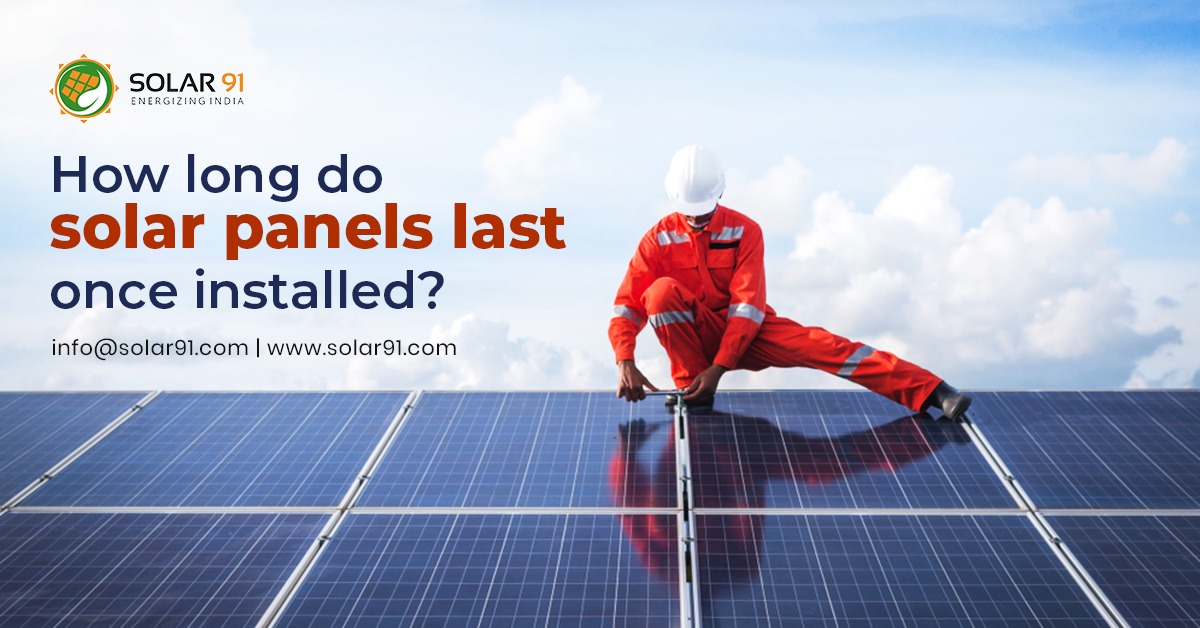How long do solar panels last once installed?
Organizations and industries around the world are becoming increasingly interested in making lifestyle sustainable. And to implement sustainability, going solar is the best choice. Solar energy is the wisest way to switch to clean, sustainable energy while also dramatically reducing your monthly utility bills — or even eliminating them entirely!
Solar Panel is one of your most efficient investments. They are durable and energy-saving and offer the best alternative to coal power. Solar Energy being the most reliable and environmentally friendly source of energy, gives you the maximum output for your investment. To harness maximum solar energy, solar panels are installed on the rooftop, in an open area where it can receive maximum sunlight. Since solar panels last longer, you will eventually make a worthwhile investment.
What is the Lifespan of Solar Panels?
Solar panels, photovoltaic or PV panels, are designed to last for more than 25 years. In actuality, a large number of solar panels put in place as early as the 1980s are still operating at predicted levels. Solar panels are not only incredibly durable, but their lifespan has risen significantly during the past 20 years. In addition to decades of effective performance, many solar manufacturers back their products with performance guarantees in their warranties.
Remember that just because a solar panel is predicted to last a few decades doesn’t mean it will eventually stop providing electricity. It simply implies that their energy output will decline by the amount that solar panel manufacturers believe is necessary to meet the energy requirements as needed in a day.
Do Solar Panels Degrade over Time?
Solar panels will inevitably provide less energy with time, as is the case with most technology. The degradation rate is the term for this decreased power output. The average solar panel deterioration rate is around 0.5%, which translates to a simple reduction in the energy output of 0.5% annually. Your solar panels ought to be operating at about 90% of their original output after 20 years.
Solar panels could deteriorate more quickly than expected for a number of reasons. Solar panels made of crystalline silicon may degrade more quickly if they are installed incorrectly, subjected to harsh environmental changes, or heavily soiled. Another factor to consider is the quality of the technology employed by various manufacturers.
Can you make your solar panels last longer?
Solar panels are often quite long-lasting. Many solar panels are specifically tested to guarantee that they can endure harsh weather conditions, and the majority of manufacturers test their panels to ensure that they can withstand strong winds and significant snow loads. Furthermore, solar energy systems require little to no maintenance and rarely have moving parts.
Working with a professional installer that provides top-notch customer service is the best method to keep your solar panels in operation for an extended period of time. It’s also critical to buy solar panels with strong warranties. Many panel manufacturers provide equipment warranties for their panels that last 10 to 12 years and cover flaws and environmental damage, as well as production warranties that typically last 25 years and ensure your panels will produce more energy than a certain amount. Here are a few actions you can take to make your solar panels last longer:
- Regularly get your panels checked by your installer or service provider
- Keep your panels clear of debris and other damaging materials
- Hire a good and a professional solar company
- Maintaining and replacing batteries
Standard Warranties on Solar Panel
The warranty’s duration reveals how long the manufacturer thinks a solar panel will last. The average lifespan of solar installations is 25 years. Manufacturers may guarantee that throughout this time, panels will perform at or close to their peak efficiency. The majority of warranties offer a minimum 80% output guarantee. When it comes to workmanship, there are usually separate warranties that cover specific issues such as faulty framing or junction boxes. The warranties are normally for a shorter time period and apply to workmanship and other equipment outside the panels, such as the inverter and monitoring devices.
Conclusion
Going solar is a financial investment in the planet’s future that can also result in lower power bill payments. You can make sure that your solar panel system is as sustainable as possible by thoroughly researching solar equipment manufacturers and engaging with a solar installer that supplies the products you want. Lower bills and long-lasting technology is all you get with Solar!

